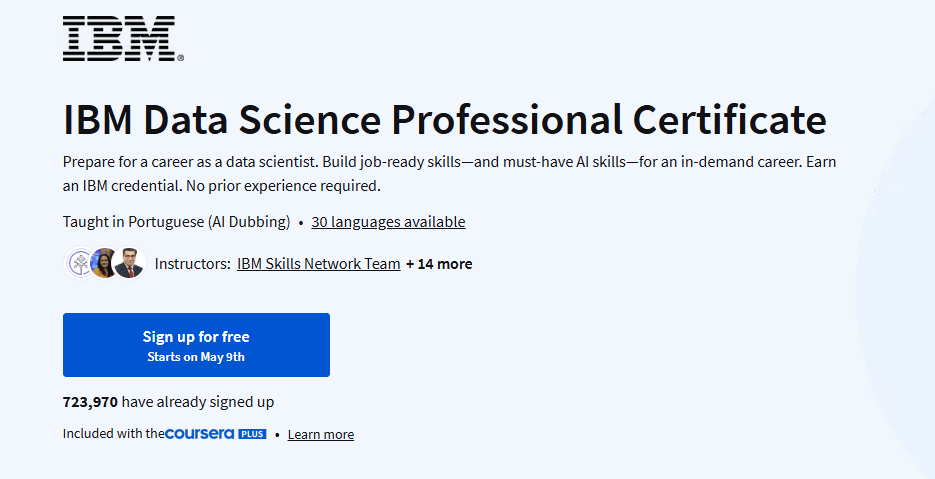A few years ago, I began to observe the explosive growth of the data science field and, like many professionals looking for qualifications, I came across several online course options. Among so many available options, the IBM Professional Certificate in Data Science on Coursera always appeared in the experts’ recommendations. After extensive research on the subject, I decided to share in this article a complete analysis of this training that has attracted thousands of students around the world.
If you’re considering starting your data science journey or looking to enhance your technical skills with a globally recognized certification, read on. I’ll explore in detail what the IBM Data Science Professional Certificate is , its content, duration, investment required, and most importantly, whether it’s worth it for your professional development in 2025.
What is the IBM Data Science Professional Certificate?
The IBM Data Science Professional Certificate is a comprehensive program available on the Coursera platform, developed by one of the largest technology companies in the world. This certification was created to meet the growing demand for professionals qualified in data analysis, machine learning and artificial intelligence.
IBM, with its vast experience in the technology sector, has structured a program that combines fundamental theoretical knowledge with real practical applications , preparing participants to face the current challenges of the data science job market.
Certificate structure
The program is organized into a series of interconnected courses that must be completed sequentially. Each module is carefully designed to build a solid foundation of knowledge and skills, progressing from basic concepts to advanced data analysis techniques. The full certification consists of 9 specific courses , each of which addresses essential skills for a data scientist.
Certificate target audience
What makes this certificate particularly appealing is its inclusive approach. The program is designed to meet:
- Beginners who want to enter the field of data science
- Professionals in career transition seeking new opportunities
- IT professionals looking to expand their skill set
- Data analysts who want to progress to more advanced roles
- University students complementing their academic education
The absence of strict prerequisites makes the program accessible, requiring only basic knowledge of mathematics and some familiarity with computers.
IBM Data Science Professional Certificate Contents
Let’s take a closer look at the program content. This overview will help you understand what to expect at each stage of the certification process.
Course 1: What is Data Science?
The first module provides a comprehensive introduction to the field of data science, exploring:
- Definition and scope of data science
- Role and Responsibilities of a Data Scientist
- Methodologies and tools used in data analysis
- Differences between data science, machine learning and artificial intelligence
- Current trends and real use cases
This module establishes the conceptual foundations necessary for subsequent courses, presenting a panoramic view of the area.
Course 2: Tools for Data Science
After understanding the fundamental concepts, the second module presents the main tools used by professionals, including:
- Python and R for data analysis
- Jupyter Notebooks for interactive development
- GitHub for version control and collaboration
- IBM Watson Studio for Data Science Projects
- Popular libraries like Pandas, NumPy, Matplotlib, and Scikit-learn
Here, participants begin to develop practical skills essential for the day-to-day work of a data scientist.
Course 3: Data Science Methodology
This module focuses on structured approaches to solving problems with data:
- CRISP-DM Methodology (Cross-Industry Standard Process for Data Mining)
- Defining business problems and objectives
- Data collection and preparation
- Data exploration and visualization
- Development of predictive models
- Evaluation and implementation of solutions
Learning a structured methodology is essential to tackle complex data science projects in an organized and efficient manner.
Course 4: Python for Data Science and AI
Python has become the predominant language in data science, and this course covers:
- Basic and advanced concepts of programming in Python
- Data structures and array manipulation
- Exploratory Analysis with Pandas
- Data Visualization with Matplotlib and Seaborn
- Introduction to APIs and External Data Integration
Mastering Python is an important differentiator in today’s job market, and this module provides a solid foundation in the language.
Course 5: SQL Database for Data Science
The ability to work with databases is essential for any data scientist. This module covers:
- Fundamental concepts of relational databases
- SQL language for querying and manipulating data
- Connecting Python to Databases
- Data analysis using SQL
- Query optimization for large volumes of data
Many data science projects begin with extracting data from corporate databases, making these skills extremely valuable.
Course 6: Data Analysis with Python
This module delves into exploratory analysis techniques:
- Importing and cleaning datasets
- Descriptive statistics and exploratory analysis
- Handling missing data and outliers
- Bivariate and multivariate analysis
- Basic statistical inference
Data analysis is the foundation on which predictive models are built, and this course develops essential skills in this area.
Course 7: Data Visualization with Python
Effectively communicating insights is as important as the analysis itself:
- Data Visualization Principles
- Advanced tools like Matplotlib, Seaborn and Folium
- Statistical and exploratory graphics
- Interactive visualizations and dashboards
- Storytelling with data
Data scientists need to transform complex analyses into understandable visualizations for non-technical stakeholders.
Course 8: Machine Learning with Python
This module introduces machine learning concepts and techniques:
- Supervised algorithms (regression, classification)
- Unsupervised algorithms (clustering, dimensionality reduction)
- Model evaluation and selection
- Overfitting and cross-validation
- Practical implementation with Scikit-learn
Machine learning represents one of the most valued skills in today’s data science market.
Course 9: Data Science Capstone Project
The final module integrates all the knowledge acquired into a practical project:
- Defining a real business problem
- Collecting and preparing a complex dataset
- Exploration and visualization to identify patterns
- Development of predictive models
- Presentation of results and recommendations
This project serves as a demonstration of the acquired skills and can be included in the professional portfolio.
IBM Data Science Professional Certificate Duration
One of the most frequently asked questions about the program is: how long is the IBM Professional Certificate in Data Science?
The program is designed to be flexible and adapt to each participant’s schedule. According to Coursera statistics, most students complete the certificate in approximately 3 to 6 months , dedicating about 5 to 10 hours per week to studying.
Factors influencing duration
Completion speed can vary significantly based on:
- Prior knowledge of programming and statistics
- Time available for weekly study
- Individual pace of learning
- Complexity of the chosen capstone project
- Involvement in optional activities and discussion forums
It is important to highlight that the platform allows you to study at your own pace, without strict deadlines for completing the modules.
Suggested schedule
For those looking for a reference, here is an approximate schedule based on weekly dedication:
Weekly DedicationEstimated Time to Completion4-5 hours6-8 months8-10 hours3-5 months15-20 hours2-3 months
I strongly recommend not rushing the learning process . Proper absorption of content and consistent practice are more important than speed of completion.
IBM Data Science Professional Certificate Cost
Financial investment is a decisive factor when choosing an educational program. Many people wonder: how much does the IBM Professional Certificate in Data Science on Coursera cost?
Available payment models
Coursera offers two main options for accessing the certificate:
- Monthly Subscription : Approximately $39-49 per month, giving you access to all courses in the program while your subscription is active
- Financial aid : Available to students who demonstrate need, with the possibility of a significant reduction in the amount
Is the IBM Data Science Professional Certificate free?
This is a common question among those interested. The short answer is: not completely .
While you can audit (watch) most of the content for free, to receive the official certificate and have access to all assessments and the capstone project, you will need to pay for a Coursera subscription. The free audit option allows access to the course material, but does not include :
- Formal assessments and practical exercises
- Personalized feedback from instructors
- Final capstone project
- Official certificate recognized by IBM
Estimated total investment
Considering the average completion time, the approximate total investment would be:
Completion TimeTotal Investment (Monthly Subscription)3 months$117-1476 months$234-2948 months$312-392
This represents excellent value for money when compared to in-person programs or intensive data science bootcamps, which can easily cost upwards of $10,000.
Return on Investment (ROI)
To assess whether the investment is worth it, consider:
- Potential Salary Increase : Certified data science professionals often report significant salary increases
- Job Opportunities : The Global Market for Data Scientists Continues to Expand
- Practical Skills Development : The program develops immediately applicable skills
- Recognized Credential : IBM certification is valued by recruiters internationally
With average salaries for entry-level data scientists ranging from $70,000 to $95,000 annually across global markets, the return on investment tends to be extremely positive.
Is the IBM Data Science Professional Certificate any good?
This is a subjective question, but I can highlight objective aspects that distinguish this program from other alternatives available on the market.
Certificate Strengths
- Institutional Credibility : IBM is a leading technology company with deep expertise in data analytics, cognitive computing, and artificial intelligence.
- Practical approach : The program emphasizes real-world applications and hands-on projects, not just theory.
- Updated curriculum : Content is regularly reviewed to incorporate the latest tools and methodologies
- Active Community : Access to discussion forums with other students and professionals
- Learning flexibility : Study at your own pace, adapting the course to your schedule
- Global recognition : The certification is internationally recognized by employers
- Qualified Instructors : Courses are taught by experienced IBM professionals
- Compatibility with other certifications : The program can be complemented with other specialized IBM certifications
Possible limitations
- Depth on advanced topics : Some very specific topics can be covered in an introductory way
- Limited interaction with instructors : The online format does not offer the same level of interaction as an in-person course
- Need for self-discipline : Flexibility requires commitment and personal organization
- Focus on specific tools : The program places special emphasis on tools from the IBM ecosystem
Feedback from former students
According to reviews available on the Coursera platform, the program maintains an average rating of over 4.6/5 stars, with over 50,000 reviews. Reviews often highlight:
- The quality of the teaching material
- The balance between theory and practice
- The immediate applicability of the knowledge acquired
- The perceived value in relation to the investment
Is the IBM Data Science Professional Certificate worth it?
Based on a comprehensive analysis of the various aspects of the program, I can say that the IBM Professional Certificate in Data Science is worth it for most professionals who want to enter or advance in the data field, especially considering:
Who benefits most from the certificate?
The program is particularly valuable for:
- Professionals in career transition : Provides a structured and comprehensive introduction to the field of data science
- Recent graduates : Complements academic training with practical skills valued by the market
- Data Analysts : Provides the technical knowledge needed to progress to more advanced roles
- Self-taught : Organizes learning in a systematic and officially recognized way
- Entrepreneurs and managers : Develop analytical skills for data-driven decision-making
When a certificate may not be the best option
The program may not fully meet the expectations of:
- Experienced data scientists : Content may be basic for already established professionals
- Specialists in very specific areas : Those who seek ultra-deep knowledge in a single technique or tool
- People with no time available : The program requires consistent commitment for adequate use
What to do after the IBM Data Science Professional Certificate
Completing your certification is just the beginning of your data science career journey. To maximize your return on investment, consider these next steps:
Continuous professional development
- Advanced specializations : Consider additional certifications in areas such as deep learning, natural language processing, or computer vision.
- Personal projects : Develop independent projects to apply your knowledge and build a differentiated portfolio
- Participating in competitions : Platforms like Kaggle offer real-world challenges that can hone your technical skills.
- Open source contribution : Participating in open source projects increases your visibility in the community
- Professional Networking : Connect with other data professionals at events and on platforms like LinkedIn and GitHub
Career opportunities
After certification, several doors may open:
- Junior/Associate Data Scientist
- Data Analyst
- Machine Learning Engineer
- Data Visualization Specialist
- Business Intelligence Consultant
- Business Insights Analyst
Salaries vary significantly by region, experience, and industry, but entry-level positions in global markets typically start in the $60,000 to $85,000 annual range.
Recommended complementary skills
To stand out even more in the market:
- Business Knowledge : Understanding the business context is critical to applying data analytics effectively
- Storytelling with data : The ability to communicate insights clearly and persuasively
- Cloud Computing : Familiarity with platforms such as AWS, Azure or Google Cloud
- Big Data : Technologies such as Hadoop, Spark and distributed processing tools
- Soft skills : Communication, teamwork and critical thinking are important differentiators
IBM Data Science Professional Certificate FAQs
Is prior knowledge required to start the certificate?
There are no strict prerequisites, but basic familiarity with mathematics, statistics, and some experience with computers will facilitate learning. The program is designed to be accessible to motivated beginners.
Is the certificate recognized by employers?
Yes, IBM certification is widely recognized in the global technology market. IBM is a respected company in the area of technology and data analysis, which gives credibility to the program.
Can I use Mac, Windows or Linux for the practical courses?
Yes, all the tools used in the course are compatible with the main operating systems. The program was designed to be accessible regardless of the platform used.
Is there technical support available during the course?
Coursera offers discussion forums where you can interact with other students and occasionally with instructors. For specific technical questions, there is a support system built into the platform.
Is it possible to transfer certificate credits to academic programs?
Some academic institutions recognize the certificate as credit for specific programs, but this varies from university to university. I recommend checking directly with the institution you are interested in.
When are courses open for registration?
Certificate courses are available on Coursera on a rolling basis, with no specific start dates. You can start at any time at your convenience.
What happens if I can’t study for a few weeks?
The flexible course format allows for breaks in your studies. If you are using the monthly subscription model, you can pause your subscription and resume it later, although this may increase the total time to completion.
READ ALSO:
What Does a Back-End Developer Do
Best Professional Certificates on Coursera
What Does an IT Professional Do
Conclusion: A Gateway to the World of Data
After analyzing in detail all aspects of the IBM Professional Certificate in Data Science , I can conclude that this program represents an excellent option for those who want to enter or advance in the field of data analysis. The combination of updated content , practical approach , study flexibility and institutional credibility offers a significant advantage compared to other alternatives available on the market.
The financial investment is relatively modest when you consider the potential return in terms of professional development and career opportunities. The structure of the program allows even beginners to build a solid foundation of knowledge and practical skills, which are highly valued in today’s market.
As with any educational process, success depends not only on the quality of the teaching material, but also on the student’s commitment. The self-paced format requires discipline and consistency, but provides the freedom to adapt learning to individual needs.
If you’re considering taking the next step in your data science journey, the IBM Professional Certificate in Data Science represents a structured, recognized, and accessible path to transforming your potential into concrete skills and real career opportunities.











